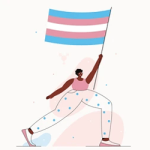The Trans and Gender Non-Conforming National Health Strategy is a five-year rights-based plan that aims to provide advancement for the health and well-being of trans people. It not only focuses on the recommendations for the health care system but also takes into consideration the ways in which the societal actors may contribute to providing a more wholistic and equitable approach to achieve services and opportunities for the transgender community.
In 2020, TransWav Jamaica produced a National Trans Health Strategy aimed at identifying the challenges being faced by the trans community. This included a needs assessment of lived experiences of the community. This multi-sector national strategy can guide the health response and address the needs of the trans community.
Studies suggest that trans people have a high risk of non-communicable diseases based on social vulnerability, poor health-seeking behavior, risk-taking and lifestyle factors such as poor diet and substance use, and the lack of access to trans-competent services.

The government should protect transgender people from discrimination by creating right-based programs, policies, legislative frameworks, and trans-friendly identity policies. They should invest in evidence-based and right-base programs to achieve health equity for the trans-community.

The trans community should form allies and engage in activities that promote trans rights and amplify trans voices. They should engage in activities promoting trans human rights in the language of health.

Healthcare providers should be trained to provide safe care to trans persons. The sector should promote trans culture competence and build trans-friendly health systems that rely on informed consent and use harm reduction principles.

Integrate trans issues into human rights agendas by consistently including trans community concerns and recognizing gender diversity. There should be active collaboration and partnership with the trans community and integrate of trans issues into human rights agendas.
We are a non-governmental organization working to advance the health, welfare, and well-being of the transgender community in Jamaica and the Caribbean. Founded in 2015, we started as an advocacy initiative in the form of a blog.
Dear Editor, Amid the picturesque landscapes and vibrant culture of